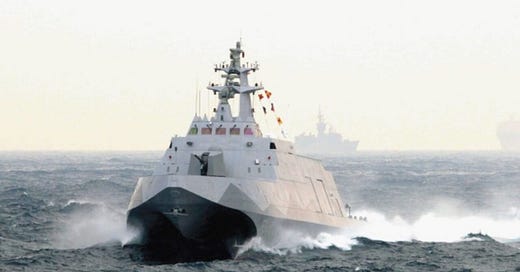Ukraine’s Moskva Sinking Spurs Taiwan to Fast-track Anti-China Defense Production
Officials want speedy craft to swarm potential PLA Navy invaders
By: Jens Kastner
Days after Ukrainian anti-ship missiles appeared to have easily sunk the guided missile cruiser Moskva, the flagship of Russia's Black Sea Fleet, Taiwan’s defense ministry announced that its navy will accelerate delivery of five Tuo Chiang-class stealth multi-mission corvettes by the end of 2023.
With China for months exerting unyielding pressure on Taiwan, which it considers a renegade province, Taiwanese officials have paid serious attention to the events unfolding in Ukraine, where a relatively small fighting force, despite heavy losses to the civilian population, has exacted enormous casualties on a huge Russian invading army which so far has been unable to establish air or sea control due to Ukrainian resistance despite two months of combat.
The accelerated construction time per Taiwanese ship has been cut to less than a year and a half, which compares to the three to four years that other countries typically need for the construction of corvettes and is an indication of the Taiwanese military’s renewed desire to field weapons that could do similar damage to similar Chinese People’s Liberation Army Navy vessels if they were to seek to support a PLA invasion of the island.
The Tuo Chiangs are 60-meter-long wave-piercing catamarans that reach speeds of 45 knots (83 km/h; 52 mph) armed with eight-each fully armed subsonic Hsiung Feng II and supersonic Hsiung Feng III anti-ship missiles launchers fully armed. Taiwan’s indigenous Hsiung Feng missiles are believed to be better than Ukraine’s anti-ship missiles, and the Taiwanese defense ministry has also revealed that a new missile factory to equip the new Tuo Chiangs will be completed in June.
Taiwan's military has ordered 11 Tuo Chiang-class corvettes so far, including two that were delivered in 2014 and 2021 respectively, following urging by US naval experts to cut back on pricey high-profile purchases like F-16 fighters and frigates and instead invest in swarms of missile-armed small craft to pummel Chinese forces in the Taiwan Strait, defeating an amphibious assault before it could reach Taiwan’s shores. China would have to use big warships like Russia’s Moskva to escort an amphibious vessel group in an invasion of Taiwan.
“Although it’s tough to say for sure how weapon systems would perform in battle without holding a battle, best I can tell, the new corvettes are excellent on a platform-by-platform basis, as is the Hsiung Feng family of missiles,” James R. Holmes, a professor at the US Naval War College, who has long been pushing for a fleet and strategy founded on such craft, told Asia Sentinel.
“Nevertheless, 11 corvettes do not make a swarm, so I would love to see lots more Tuo Chiangs in the inventory and fewer lesser warships,” he added.
In another noteworthy, related development, Taiwan’s public news agency CNA in mid-April reported that Taiwan's military will send non-commissioned officers (NCOs) to the US to observe the training of their American counterparts later this year. Previously, Taiwan's military only sent more high-level military officers to the US, including to SEAL School, Ranger School, West Point, as well as helicopter and fighter jet training.
There are obvious parallels with Ukraine, as NATO training of Ukrainian soldiers is widely being credited for contributing to their battlefield success against the Russian invaders. CNA cited an unnamed Taiwan military source as saying that such trips will be extremely helpful for Taiwanese NCOs to learn how the US trains its NCOs for joint military operations including different branches of the armed forces, which is crucial in modern warfare.
“Professional NCOs can ensure effective use of available weapons and equipment and help maintain the discipline and fighting spirit of troops, with US efforts to help bolster the professionalism of NCOs in both Ukraine and Taiwan likely to be a wise investment,” said Timothy R. Heath, Senior International Defense Researcher at the US-based RAND Corporation.
“Given that the geography of a China-Taiwan war is mostly maritime and more narrowly concentrated, a key issue for Taiwan will continue to be the possession and ability to operate adequate numbers of missiles to destroy incoming aircraft and warships. Also important will be ensuring the survivability of troops and equipment against an expected massive Chinese missile bombardment. Technical skill in operating weapons and platforms will be essential and professional NCOs can help here.”



